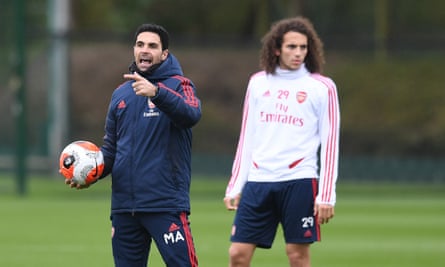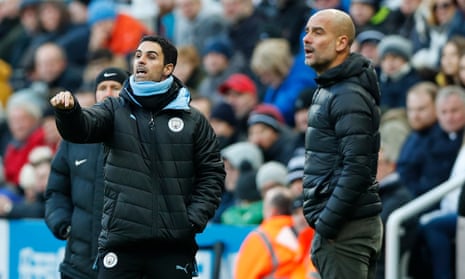The question came less than 10 minutes into Mikel Arteta’s first media briefing after taking the Arsenal job and it was, as if anybody should have expected anything else, quickly apparent he had prepared for it. How important would it be to establish himself as a manager in his own right, and not merely an assistant to Pep Guardiola who had made good? “I think that is something that is going to be written all the time,” Arteta replied. “Maybe it will take a little time but it doesn’t matter how people see me, it matters how the players see me, how they are convinced we are trying to do the right things. After that, time will take all of those links away, I think.”
It says plenty for the way Arteta has carried himself in the subsequent 12 weeks that such talk has hardly resurfaced. Nobody who crosses his path is left in doubt that he is his own man but, whether he liked it or not, the subject was bound to frame his first meeting with Guardiola as a head coach. That opportunity was taken away from him – for now – with Wednesday night’s game called off following a positive test for coronavirus returned by Olympiacos owner Evangelos Marinakis, whose side played at the Emirates Stadium on 27 February.
The questions for Arteta came thick and fast on Monday to the extent that, when they were done, it was clear he could hardly depart quickly enough; the balance he struck, though, was one of business as usual and genuine affection for his former workplace.
“I have some really good memories and people there I love a lot, respect and am in contact with so I wouldn’t expect something different,” he said of the potential for a good reception at City, where he spent three and a half years. The pair still speak often; in an industry where many prefer coyness about their channels of communication, Arteta has never felt obliged to hide that. The pre-match elbow bumps would have been heartfelt even if, in certain quarters, there remains annoyance about the methods Arsenal were perceived to have used to lure him south in December.
“I still have a lot of contact with everyone there so they don’t seem that upset with me,” Arteta said. Nobody has ever questioned his conduct but it is fair to suggest the atmosphere at boardroom level will not be at its most convivial given City’s well-briefed distaste with their Arsenal counterparts at the time.

On pitch level there will be no axes to grind or points to prove when the two sides do meet in the rearranged fixture. Arteta was happy to expand on how Guardiola – “a key figure since I was 15 years old” – has been a source of support professionally and personally, while when he reeled off a list of the Catalan’s strengths it was hard not to tally some with his own blueprint for the job. “He is braver than any other manager, wants to take more risks and play the way he wants,” Arteta said. “It does not matter what, he will maintain that line. I never heard a player doubt: ‘Can we play like this or should we play like this?’ They are all so convinced, as he does not leave one drop of doubt about what needs to be done.”
Such clarity has been fundamental to Arteta since he first began considering management. He is bringing it to an Arsenal side that had been grievously lacking direction and, in a low-frills way, it is making a difference. They have taken only two fewer points than City in their past 10 top-flight games and have lost one match to their opponents’ three. It will remain a slow burn and there can, he said, be no “copy-paste” from what worked in Manchester. Success did not come overnight there either and, rather than sculpting his own beliefs, he believes the victories that followed ended up proving their validity.
“It reinforced them,” he said. “After the first season I think the process was really good but we didn’t win any trophies. And instead of anybody above – owners, sporting directors, or anyone who were involved – doubting about what was possible to do in England they were all in: this is the way that we want to do it. And look what happened after.”
A fourth consecutive league win, and a first at the Etihad since 2015, would have reflected glowingly on the process Arteta has begun at Arsenal. “If I go through all the details it will drive them mad,” he said when asked whether, given his knowledge of the hosts, he would prepare his players in special depth. Simplicity is essential and there is always the knowledge that he has faced a situation like this before.
Arteta was reminded that, four months into his first season at City, Guardiola put him in charge for this fixture given he had only recently retired from playing at Arsenal and would be better apprised of their methods. City won 2-1. “I can’t remember now,” he claimed when asked for his recollections of that day, before making himself scarce. He will now have to wait for another outcome in his favour that would surely wrench away any lingering narratives about Arteta the assistant coach for good.

Comments (…)
Sign in or create your Guardian account to join the discussion